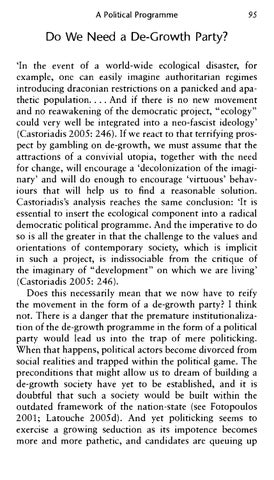A Political Programme
Do We Need
a
95
De-G rowth Party?
'In the event of a world-wide ecological disaster, for example, one can easily imagine authoritarian regimes introducing draconian restrictions on a panicked and apathetic population. . . . And if there is no new movement and no reawakening of the democratic project, "ecology" could very well be integrated into a neo-fascist ideology' (Castoriadis 2005: 246). If we react to that terrifying prospect by gambling on de-growth, we must assume that the attractions of a convivial utopia, together with the need for change, will encourage a 'decolonization of the imaginary' and will do enough to encourage 'virtuous' behaviours that will help us to find a reasonable solution. Castoriadis's analysis reaches the same conclusion: 'It is essential to insert the ecological component into a radical democratic political programme. And the imperative to do so is all the greater in that the challenge to the values and orientations of contemporary society, which is implicit in such a project, is indissociable from the critique of the imaginary of "development" on which we are living' (Castoriadis 2005: 246). Does this necessarily mean that we now have to reify the movement in the form of a de-growth party? I think not. There is a danger that the premature institutionalization of the dc-growth programme in the form of a political party would lead us into the trap of mere politicking. When that happens, political actors become divorced from social realities and trapped within the political game. The preconditions that might allow us to dream of building a dc-growth society have yet to be established, and it is doubtful that such a society would be built within the outdated framework of the nation-state (see Fotopoulos 2001; Latouche 2005d). And yet politicking seems to exercise a growing seduction as its impotence becomes more and more pathetic, and candidates are queuing up






